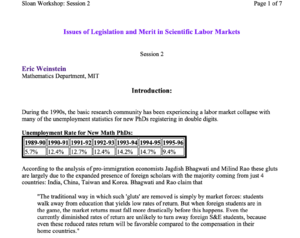Issues of Legislation and Merit in Scientific Labor Markets (Content)
Eric Weinstein's 2003 Sloan Workshop report "Issues of Legislation and Merit in Scientific Labor Markets" examines the challenges facing scientific labor markets, particularly in the U.S., due to changes in immigration policy and labor market conditions. It highlights the significant rise in unemployment rates for new PhDs in the 1990s, arguing that an influx of foreign scholars, incentivized by immigration laws and economic disparities, has contributed to a glut of scientists. Weinstein critiques the assumption that science, as an international meritocracy, benefits unequivocally from open borders. He suggests that this influx can distort labor markets by lowering wages and discouraging domestic talent from pursuing careers in science and engineering.
The paper digs into various legislative provisions, such as "Special Handling" and "Schedule A," which give universities unique advantages in hiring foreign scholars, potentially at the expense of American researchers. Additionally, Weinstein discusses the impact of these policies on risk aversion in hiring practices, opportunity costs for U.S. students, and overall morale in the scientific community. He calls for a reevaluation of immigration policies and their effects on scientific labor markets, urging a balance between international openness and the protection of domestic talent to ensure long-term benefits for the research ecosystem.
Summary by Section[edit]
Introduction[edit]
The paper begins by highlighting the labor market collapse experienced by the basic research community in the 1990s, marked by rising unemployment rates for new PhDs in scientific fields, particularly mathematics. Eric Weinstein references economists Jagdish Bhagwati and Milind Rao, who attribute this glut in the labor market to the increased presence of foreign scholars, primarily from four countries: India, China, Taiwan, and Korea. They argue that the lower market returns in science are not enough to dissuade foreign students, even though they might discourage domestic talent.
Markets and Meritocracy[edit]
Weinstein examines the concept of an "international meritocracy" in science, where open borders are seen as a benefit to the scientific community. However, Weinstein argues that this assumption does not hold up under a labor market analysis.
A simple model involving two countries with differing levels of wealth and talent distribution is presented to illustrate how open borders might not necessarily lead to better outcomes, especially if risk aversion is taken into account. The discussion includes the potential adverse effects on local outcomes in wealthier countries if the risk associated with hiring foreign scientists outweighs the benefits of their contributions.
Risk Aversion: A Potential Principal-Agent Problem[edit]
Weinstein highlights how the needs of employers to access "the best and the brightest" differ between the scientific community and economic discussions. Employers often value lower-risk candidates, which can lead to a preference for less innovative researchers during periods of labor surplus. The paper suggests that expanding access to foreign scholars can reduce expected returns for research at a national level, even if individual employers gain from a broader labor pool.
Opportunity Costs and the American Scientist[edit]
The economic opportunity costs for American students pursuing careers in science are compared to those of students from less developed countries. U.S. students face higher opportunity costs, limited immigration incentives, and a lack of secondary employment markets. Weinstein argues that these factors may discourage top domestic talent from entering scientific fields.
Morale as an Input[edit]
The paper discusses the negative impact of excess applicants on morale within the scientific community. High applicant numbers may result in deteriorating employment terms, potentially undermining productivity and innovation in research.
Migration Statistics & Legislation[edit]
Weinstein provides data on the increase in immigration of university professors after the Immigration Act of 1990, noting that this legislation dramatically increased the number of professors migrating to the U.S. within a short period. The paper highlights legislative provisions like "Special Handling" and "Schedule A," which have provided universities with unique privileges regarding hiring foreign scholars.
The Sheepherder Provision: Special Handling[edit]
Weinstein recounts the history of the "Special Handling" provision in U.S. immigration law, which originally targeted Basque sheepherders but was later expanded to include universities. He thus questions the claim by the Association of American Universities (AAU) that labor certification protects American researchers, suggesting that universities may use this provision to bypass hiring domestic talent.
The Shortage Provision: 'Schedule A'[edit]
The "Schedule A" list of shortage occupations has included university professors for decades, despite high unemployment rates among new PhDs, conflicting with the claim that universities are experiencing labor shortages.
Weinstein critiques the mandate that universities remain on this list indefinitely, irrespective of actual labor market conditions.
The 'Einstein Exemption': Priority 1 Aliens with Extraordinary Abilities[edit]
This section discusses the growing number of foreign scholars categorized as "Priority 1" immigrants with extraordinary abilities and how this category has expanded over time.
The implications of this growth are examined in the context of market impact and the rationale for such immigration policies.
The Anti-Shortage Quota[edit]
The paper delves into the history of concerns about a potential shortfall in scientists and engineers, which led to increased permanent visas in response to alarmist studies. Later reviews cast doubt on the credibility of these studies.
Issues for Further Exploration[edit]
Weinstein raises several questions about the misrepresentation of foreign applicants, economic modeling in scientific labor markets, and the consequences of exempting certain workers from labor laws.
The paper ultimately questions the long-term effects of policies that prioritize expanding the pool of foreign scientists in the U.S. over nurturing domestic talent, suggesting that hidden costs and unintended consequences need to be addressed.

